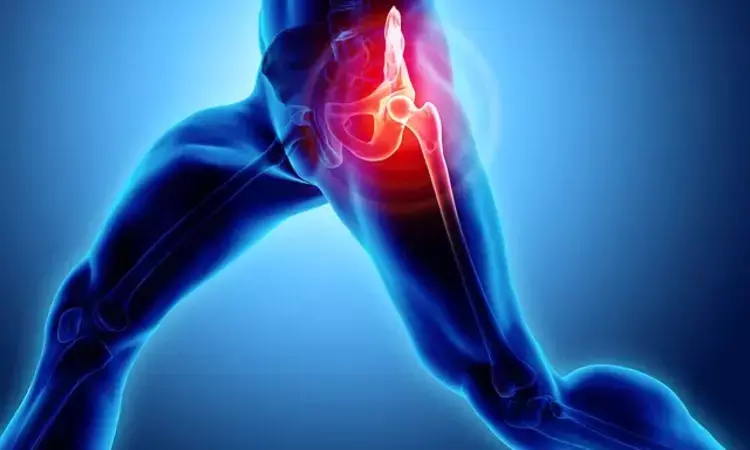- Home
- Medical news & Guidelines
- Anesthesiology
- Cardiology and CTVS
- Critical Care
- Dentistry
- Dermatology
- Diabetes and Endocrinology
- ENT
- Gastroenterology
- Medicine
- Nephrology
- Neurology
- Obstretics-Gynaecology
- Oncology
- Ophthalmology
- Orthopaedics
- Pediatrics-Neonatology
- Psychiatry
- Pulmonology
- Radiology
- Surgery
- Urology
- Laboratory Medicine
- Diet
- Nursing
- Paramedical
- Physiotherapy
- Health news
- Fact Check
- Bone Health Fact Check
- Brain Health Fact Check
- Cancer Related Fact Check
- Child Care Fact Check
- Dental and oral health fact check
- Diabetes and metabolic health fact check
- Diet and Nutrition Fact Check
- Eye and ENT Care Fact Check
- Fitness fact check
- Gut health fact check
- Heart health fact check
- Kidney health fact check
- Medical education fact check
- Men's health fact check
- Respiratory fact check
- Skin and hair care fact check
- Vaccine and Immunization fact check
- Women's health fact check
- AYUSH
- State News
- Andaman and Nicobar Islands
- Andhra Pradesh
- Arunachal Pradesh
- Assam
- Bihar
- Chandigarh
- Chattisgarh
- Dadra and Nagar Haveli
- Daman and Diu
- Delhi
- Goa
- Gujarat
- Haryana
- Himachal Pradesh
- Jammu & Kashmir
- Jharkhand
- Karnataka
- Kerala
- Ladakh
- Lakshadweep
- Madhya Pradesh
- Maharashtra
- Manipur
- Meghalaya
- Mizoram
- Nagaland
- Odisha
- Puducherry
- Punjab
- Rajasthan
- Sikkim
- Tamil Nadu
- Telangana
- Tripura
- Uttar Pradesh
- Uttrakhand
- West Bengal
- Medical Education
- Industry
Cycling intervention improved self-reported function in hip osteoarthritis patients: Study

A new study published in the journal of The Lancet Rheumatology showed that a cycling and education intervention dramatically improved self-reported function in individuals with hip osteoarthritis (OA) when compared to routine physiotherapy.
For patients with hip osteoarthritis referred for physiotherapy at a UK hospital, the cycling and education intervention (CLEAT) trial sought to compare the clinical and cost-effectiveness of the group-based cycling and education program known as the Cycling Against Hip Pain (CHAIN) intervention with standard physiotherapy care.
The participants over 18 years with joint discomfort from activities, and no morning stiffness or morning stiffness that lasted not more than 30 minutes, and who met primary-care requirements for exercise referral were included.
Using randomly permuted blocks of sizes 2, 4, and 6, participants were randomized (1:1) to receive either the CHAIN intervention or standard physiotherapy care. The CHAIN intervention group's participants participated in an 8-week group program that included education and static cycling at a nearby recreation center.
Depending on standard care at the time of treatment, participants in the physiotherapy group received their regular one-on-one care from a physiotherapist at the nearby hospital or over the phone. The Hip Disability and Osteoarthritis Outcome Score (HOOS) activities of daily living subscale differences between groups at 10 weeks after therapy (visit 4) were the main outcome.
A parallel economic evaluation from the major viewpoints of personal social services and the UK NHS was part of the study. Data on safety and adverse events were gathered between baseline and visit 4, and the effectiveness analysis included all individuals who submitted data at that point.
Almost, 221 individuals were enrolled in the trial between February 24, 2020, and April 28, 2023, and they were randomized to receive either standard physiotherapy care (111 [50%]) or the CHAIN intervention (110 [50%]).
The mean age of the participants was 64·4 years (SD 9·5), with 126 (57%) being female, 95 (43%) being male, and 217 (98%) being White.
When compared to those in the standard physiotherapy care group, individuals in the CHAIN group showed higher gains in mean HOOS activities of daily living subscale scores.
The primary result indicated that CHAIN was statistically significantly better than standard physiotherapy; however, the between-group difference of 6·9 HOOS points fell short of the minimal clinically meaningful difference of 7·4.
When compared to standard physiotherapy care, CHAIN cost £4092 every quality-adjusted life year gained, which is less than the £20,000–$30,000 National Institute of Health and Care Excellence cost-effectiveness benchmark. There were no significant side effects from the therapy.
Overall, the CHAIN intervention demonstrated better results than standard physiotherapy care, and it is feasible to provide a low-cost, community-based intervention.
Source:
Wainwright, T. W., Immins, T., Docherty, S., Saunders, G., Hawton, A., Goodwin, E., Rees, T., Low, M., Samways, J., Webley, F., Howard, N., Lee, P. H., & Middleton, R. G. (2025). Clinical and cost-effectiveness of a cycling and education intervention versus usual physiotherapy care for the treatment of hip osteoarthritis in the UK (CLEAT): a pragmatic, randomised, controlled trial. The Lancet. Rheumatology. https://doi.org/10.1016/S2665-9913(25)00102-X
Neuroscience Masters graduate
Jacinthlyn Sylvia, a Neuroscience Master's graduate from Chennai has worked extensively in deciphering the neurobiology of cognition and motor control in aging. She also has spread-out exposure to Neurosurgery from her Bachelor’s. She is currently involved in active Neuro-Oncology research. She is an upcoming neuroscientist with a fiery passion for writing. Her news cover at Medical Dialogues feature recent discoveries and updates from the healthcare and biomedical research fields. She can be reached at editorial@medicaldialogues.in
Dr Kamal Kant Kohli-MBBS, DTCD- a chest specialist with more than 30 years of practice and a flair for writing clinical articles, Dr Kamal Kant Kohli joined Medical Dialogues as a Chief Editor of Medical News. Besides writing articles, as an editor, he proofreads and verifies all the medical content published on Medical Dialogues including those coming from journals, studies,medical conferences,guidelines etc. Email: drkohli@medicaldialogues.in. Contact no. 011-43720751


